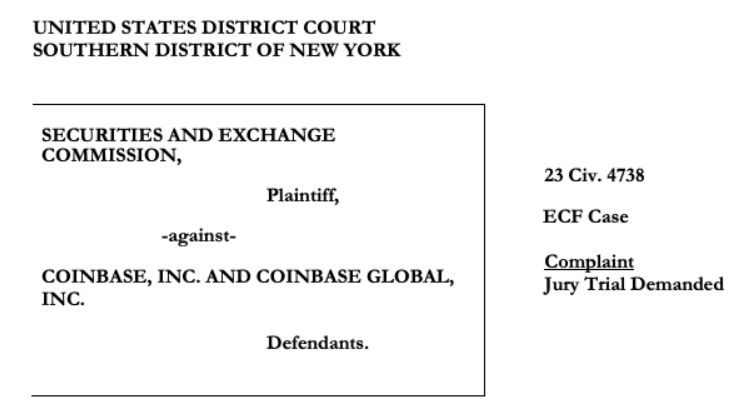
On June 6, 2023, the SEC filed a complaint in the Southern District of New York against Coinbase, Inc. (Coinbase), and Coinbase Global, Inc. (CGI), alleging a number of violations of the US federal securities laws (the Coinbase Complaint)1 that are substantially similar to those alleged in the complaint filed just one day prior against Binance.
Allegations
1. Operation of an Unregistered Exchange, Broker-Dealer, and Clearing Agency
The SEC alleges Coinbase violated the Exchange Act and acted as an unregistered broker, an unregistered exchange, and an unregistered clearing agency by offering its crypto trading platform (Platform). It also alleges Coinbase acted as an unregistered broker in providing its Coinbase Prime product and Coinbase Wallet product.
Unregistered Broker
According to the SEC, Coinbase acted as a broker by offering several products – the Platform, Prime, and Wallet – which it used to effect transactions in securities for the account of others by soliciting potential investors in securities, holding itself out as a place to buy and sell securities, facilitating trading in securities by opening customer accounts and handling customer funds and securities (which it commingled and treated as fungible) through Coinbase-controlled accounts and digital wallets, and being compensated for doing so.
Coinbase Prime permitted institutional customers to route crypto asset orders to the Coinbase trading platform and other third-party trading venues. Coinbase Wallet allows users to connect to decentralized trading software. Unlike the other products described in this Complaint, Coinbase Wallet is a self-custody wallet that allows users to hold and manage their own private keys and crypto assets.
This allegation that Coinbase acted as a broker by providing a non-custodial wallet is significant. It is the first instance in which the SEC asserted the developer of non-custodial software is responsible for the unregistered securities purchased using such software (i.e. a wallet), even though such orders are not routed through a platform maintained by the developer. It is essentially an attempt to prohibit DeFi protocols by regulating the wallet providers. If the SEC's interpretation of the law is adopted, it will have wide-reaching effects on DeFi.
The SEC also seeks to regulate DeFi protocols directly as evidenced by its proposed amendments to Exchange Act Rule 3b-16, namely to expand the scope of the definition of an exchange.2 In reopening the comment period for such proposed amendments, the SEC reiterated its position that existing rules apply to platforms that trade crypto asset securities, including "DeFi" systems, but the proposed amendments will render rebuttals to that position moot.
Unregistered Exchange
The SEC alleges Coinbase offered an exchange through its Platform by bringing together the orders of multiple buyers and sellers of crypto assets that were offered and sold as securities using a trading facility programmed with non-discretionary rules for orders to interact and buyers and sellers to agree upon the terms of trades in these securities.
Unregistered Clearing Agency
The SEC also alleges Coinbase acted as a clearing agency because it served as an intermediary in settling transactions and acted as a custodian of securities by requiring customers to deposit their assets in Coinbase-controlled wallets, creating a system for the central handling of securities whereby securities deposited and traded on the Coinbase Platform were treated as fungible and customer accounts debited and credited by Coinbase to settle customers' transactions.
2. Unregistered Offer and Sale of Securities
The Coinbase Complaint alleges that 13 crypto assets supported by Coinbase are offered and sold as investment contracts according to the SEC's interpretation of the Howey test: SOL, ADA, MATIC, FIL, SAND, AXS, CHZ, FLOW, ICP, NEAR, VGX, DASH, and NEXO.
The SEC also alleges that Coinbase violated the Securities Act by offering and selling unregistered securities through its offer and sale of its staking program. It alleges further that Coinbase has deprived investors of material information about the company and its staking rogram offerings, including how Coinbase uses the offering proceeds and the risks and trends that affect the enterprise and investment in the staking program.
3. Liability as to CGI
Similar to the actions against Binance and Bittrex, the SEC alleges that a non-U.S. affiliate is also liable for the violations as a control person under Section 20(a) of the Exchange Act. The SEC cites consolidated balance sheets, a shared board of directors, shared executive officers, and share websites and social media channels, among others, to support its claim that CGI is liable for Coinbase's Exchange Act violations because it exercised power and control over Coinbase.
Relief
The SEC seeks to permanently enjoin Coinbase and CGI from further violations of the Exchange Act and Coinbase from further alleged violations of the Securities Act. It also seeks disgorgement of ill-gotten gains from the alleged Exchange Act and Securities Act violations and civil monetary penalties.
We continue to follow closely this case and the case against Binance as both suits make their way through the Courts and will post pertinent updates as they occur.
Footnotes
1 SEC Press Release, SEC Charges Coinbase for Operating as an Unregistered Securities Exchange, Broker, and Clearing Agency (Jun. 6, 2023), https://www.sec.gov/news/press-release/2023-102.
2 SEC Press Release, SEC Reopens Comment Period for Proposed Amendments to Exchange Act Rule 3b-16 and Provides Supplemental Information (April 14, 2023) https://www.sec.gov/news/press-release/2023-77
Originally published by 26 June 2023
The content of this article is intended to provide a general guide to the subject matter. Specialist advice should be sought about your specific circumstances.


